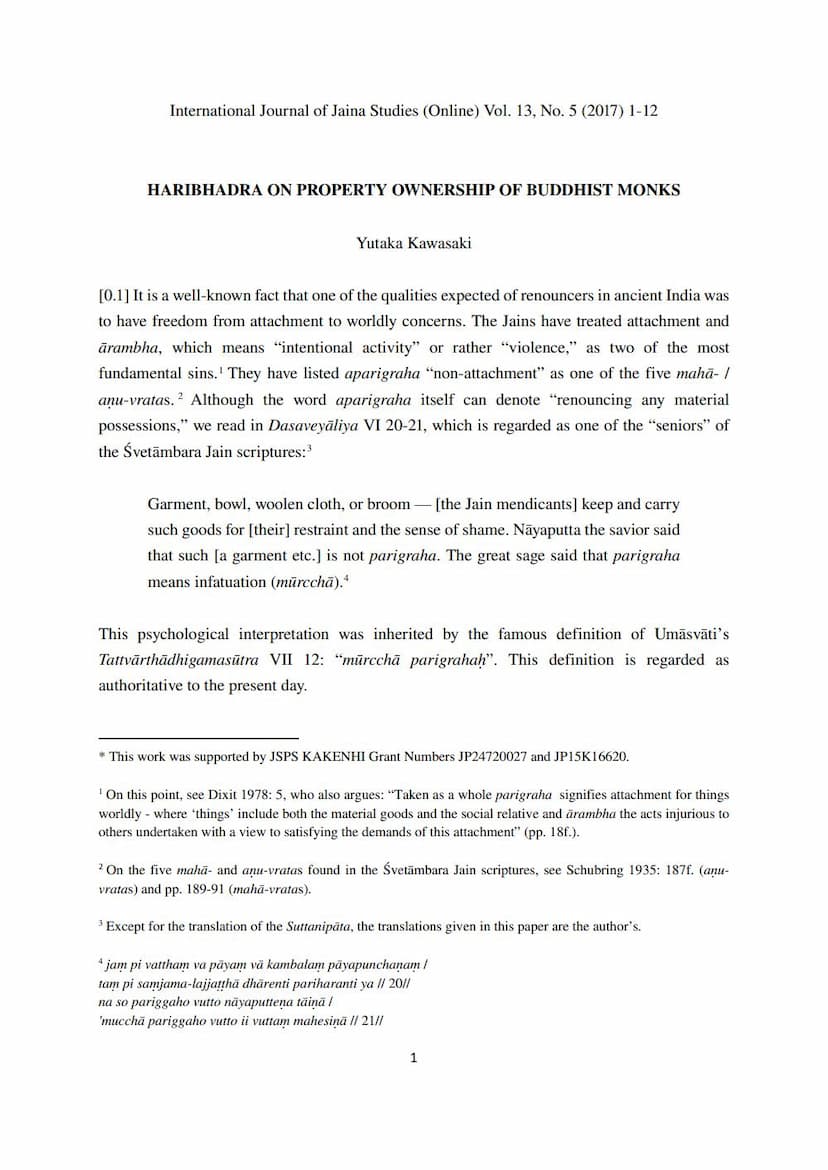Haribhadra On Property Ownership Of Buddhist Monk
Added to library: September 1, 2025

Summary
This article, "Haribhadra On Property Ownership Of Buddhist Monk" by Yutaka Kawasaki, explores a debate between the Jain monk Haribhadra and unnamed Buddhist opponents regarding the permissibility of monks owning property.
The core of the discussion hinges on the Jain concept of aparigraha (non-attachment), which Haribhadra and Jain tradition define not as the mere absence of material possessions, but as the absence of mūrcchā (infatuation or clinging). This means that even if a monk possesses certain essential items for their practice, it is not considered attachment if there is no emotional clinging to them.
The article contrasts this with Buddhism. While the Buddha also emphasized freedom from attachment (using the term pariggaha, the Pāli equivalent of parigraha), the article notes that Indian Buddhism eventually embraced a sedentary monastic life and accumulated significant properties through donations.
The debate, as presented in the Dhammasamgahani (a work attributed to Haribhadra), centers on the Buddhist justification for monks possessing property. The Buddhist argument is that monks are faultless if:
- They are free from possessiveness (mamattarahia) in their minds.
- Their acquisition of possessions and intentional activities (ārambha) are solely for the sake of the three jewels (Buddha, Dharma, Sangha).
Haribhadra strongly refutes these claims. His primary arguments include:
- The inherent connection between property ownership and ārambha (intentional activity/violence): Haribhadra argues that possessing property inevitably leads to intentional activity, which in turn leads to violence. He likens this to renaming poison "sweet" – the substance remains harmful regardless of the name.
- The deceptive nature of redefining terms: Haribhadra criticizes the Buddhist attempt to call intentional activities for property ownership something else, similar to how some Japanese Buddhists called alcoholic beverages "hot water for wisdom" to circumvent prohibitions. He maintains that a sinful act remains sinful, regardless of the label.
- The corruption of virtue: Haribhadra argues that property ownership is a reprehensible activity that spoils a monk's virtue. He believes that a virtuous monk should engage only in blameless service.
- The problem of "allowing": Haribhadra contends that if monks "allow" laypeople to engage in property ownership for their benefit, they are not true bhikkhus (monks) because they are implicitly condoning or participating in the associated intentional activities.
- The slippery slope argument (atiprasanga): Haribhadra argues that if a monk possessing property is considered an exception to the rule of non-attachment, then laypeople who possess property should also be considered monks under similar exceptional circumstances, which is an absurd conclusion.
- The destruction of the "seed for good conduct" (caranapariņāmabīja): Haribhadra insists that property ownership inherently leads to mental defilements (parikleśa), which in turn destroys the potential for spiritual progress.
The Buddhist opponent defends their position by referencing the Jain figure of Bharata, the universal emperor who owned 960 million villages but is believed in Jain tradition to have attained omniscience. They argue that Bharata's possession of wealth did not destroy his "seed for good conduct."
Haribhadra counters this by emphasizing the Jain definition of aparigraha as the absence of mūrcchā (infatuation). He argues that Bharata, despite owning vast properties, was not infatuated with them and therefore did not engage in ārambha or violence in relation to his possessions. In contrast, he asserts that the Buddhist monks advocating for property ownership are still driven by infatuation, thus committing ārambha and falling short of true non-attachment.
Finally, the article touches on the Buddhist argument that such practices are permitted due to the "bad era" or are authorized by Buddhist scriptures. Haribhadra dismisses these as excuses for sinful activities.
In conclusion, the article highlights a fundamental difference in how Jainism and Buddhism approach the concept of renunciation and property. While both value freedom from attachment, Haribhadra's Jain perspective insists on a stricter interpretation where even the act of possessing property is inherently problematic if it leads to intentional activity and potential violence, regardless of mental disposition or scriptural justification. The Buddhist perspective, as portrayed by Haribhadra's opponents, appears more lenient, allowing for property ownership if the monk's mind remains detached and the purpose is virtuous.